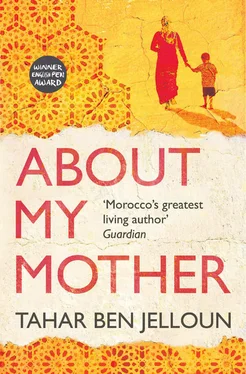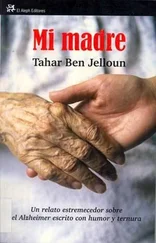She thinks it’s next week and reminds me that I have to buy a sheep and distribute the meat to the poor. She adds that it’s best to give Keltum the money to buy what she wants. I did all that at the time of the festival. I tell Mother not to worry. I want and need to go and spend a few days with her, I need to talk to her, to ask her why the upbringing she gave me didn’t prepare me for the ways people trick you. She’ll tell me that you have to carry on regardless. She’s always kept a distance, looked after her home and her children, she’s never voiced envy or jealousy of the people around her. I look at her and I see, or rather I imagine, all that she’s endured in silence, never crying out, never protesting, never demanding justice. I’ve always detected in her attitude, her voice and her words something that marked her as the victim, the innocent unable to defend or avenge herself. Victim of whom, of what? I don’t know. Perhaps she didn’t experience the joys and pleasures she’d hoped for from life. In the early days of her widowhood, I noticed that her general condition had improved. She was relieved, as if my father’s death had liberated her, given her some rest, almost a summer holiday. She had been waiting for that moment, saying: ‘May God grant me even one day to live a full life, without that man!’
I can’t tell her that ‘marriage is a work in progress’. The words won’t translate into colloquial Arabic. She’ll look at me as if to make sure that I’m not laughing at her and then say: ‘What on earth do you know about life?’ She’ll tell me that here, ‘Everyone should know their place. We let things take their course; the path was forged by our ancestors, so we get through life as best we can. Some do well, others spend their days moaning. Me, I turn to God and give thanks.’ ‘What kind of life have I had?’ she asks me one day. She answers with a long sigh and then changes the subject. It’s up to me to guess at that life.
Keltum tells my mother that she’s tempted to go to the literacy classes at the mosque: ‘The new king wants to teach us to read and write. It’s too late, but if we can at least learn numbers, I’ll be able to phone my children and grandchildren.’ Rhimou wants to enrol for the evening classes too. My mother’s panic-stricken. ‘That’s what it is, you’re all trying to get rid of me, you’re doing everything possible to make my blood pressure go up. You’re acting like young girls off to the mosque, leaving me on my own to die quickly, without my children here. While you’re about it, take my daughter Touria with you — and my mother, she’ll be only too happy to abandon me. Forget what this new king says — did he think of me, did he have a thought for people who depend on others? No, he just wants ignorant people to stop being ignorant. That’s fine by me, but why take Keltum and Rhimou from me? No, you’re being crazy and spiteful. I would never have done that to one of you. And who’s going to look after my little brother who’s ill? I know you’re going tell me he died ages ago, that I’m raving, that I’ve lost my mind. I know all that, but my little brother is not dead. He’s here, he’s right next to me. You can go, but he’ll stay by my bedside. Even though he’s ill, he won’t abandon me. He’s handsome and gentle, he’s my favourite brother. I told his wife that the other day, when we were at my son’s circumcision. She was so happy, she burst into tears. Go on then, go to the mosque, say your prayers and don’t come back. Learn to read! But what use will that be? I for one never had that opportunity. You want to learn to read so you can follow the Christians’ soap operas, the ones with the actors speaking an Arabic that none of us understands. That’s what it is, it’s just so you can go on watching TV. It’s a joke, isn’t it? You want to have a good laugh, you’re just trying to pull my leg and upset me! I’ll complain to my son, he’s coming in a bit. No, not the one who lives in France, no, the one from Casa, what’s his name?’
Keltum and Rhimou begin to laugh. Reassured, my mother tells them to go to the devil.
As soon as she sees me, she warns me: ‘Keltum is not happy. I couldn’t hold my water in, it escaped, so everything had to be changed: the clothes, the sheets, the blanket, and even the carpet.’
‘Why the carpet?’
‘I have no idea, that’s just how it is. Apparently the carpet’s dirty. But it wasn’t me that made it dirty. It’s hard to make them believe that, though. Maybe it’s a good thing if they learn to read. But I don’t want them to, I don’t want to find myself alone with two women who’ll think they’re better than me because they can decipher letters! Because once they’ve learned the alphabet, they’ll imagine they’re teachers, doctors, wise women. I know them. Son, tell me, have you thought of giving them some money on top of their wages? It’s good to be generous; if they see money, they’ll forget about the mosque and evening classes. I know they annoy me, but they deserve more than money. If I could leave them this house — well, something — I’m whispering this, because if my father hears me, he’ll tell me off and then your brother will be angry. But I’m not attached to the dirt of life. I’m going to God with empty pockets and my heart full of love for the Prophet, so I have no need of material things.’
Roland’s mother is called Zilli, short for Cecilia. He had a scare the other day when the hospital called and told him she’d had a fall and didn’t feel at all well. He asked to speak to her. Zilli didn’t recognise her son. ‘I don’t know any Roland, monsieur. You are disturbing me. I don’t have a son, so don’t try and tell me I do. I’ve never had a child, so leave me in peace, monsieur!’ This is the first time her memory’s failed her. Roland was hurt, he couldn’t believe what he’d just heard: What, me, Zilli’s only son, relegated to the status of stranger? Unthinkable.
He called her a few days later. She recognised him instantly. He laughed and asked her why she’d mistaken him for a stranger the previous time.
‘Roland darling, the older one gets, the more comical one becomes!’
I take the train to Lausanne. Roland’s waiting for me at the Hôtel de la Paix.
Zilli’s closest friend is a very wealthy woman. Unable to walk any more, she’s been given a place in Switzerland’s most luxurious old people’s home. Because Zilli’s still independent, she’s only entitled to spend a fortnight there every six months. Her friend has a Rolls Royce and a chauffeur, and from time to time she picks Zilli up and takes her for a drive. She enjoys these outings.
My mother has no friends left. Her friends were her cousins, a few neighbours, and women she’d meet at the hammam. They’d talk, moan, help each other out, lend each other party dresses and jewellery, then would lose touch when one of them moved away. My mother would have liked to have real friends, women she could confide in. In Tangier, our neighbour was a cousin of the king’s. My mother admired her understated elegance, but she was often away in Rabat. When she came back, she’d tell my mother all about her stay at the palace, and the gifts she’d received from the king. One day she gave my mother a handful of sandalwood, the fragrance of paradise. My mother was so happy, she decided to keep it for her funeral. With her cousins, there’d be outbursts of jealousy and petty squabbles. My mother hated conflict and she’d be the one to calm them down. She was seen as a peace-maker, full of wisdom. But she’d never had close, loyal friends. No one will come and take her out for a drive in a Rolls. No one will come and chat to her. She knows this and often mentions it. ‘That’s how it is. The only friend I have is in Casablanca. She’s my closest cousin and also my sister-in-law. She had that disease — I don’t want to say its name. They took away her breast and she’s been fine ever since. It’s been a long time since we saw each other. That’s only to be expected — she lives in Casablanca and Tangier isn’t exactly near. When I was young, her husband — my little brother, the one who died at forty — would often come to visit. He’d take me out in his car and show me the city and the surrounding countryside. I loved him very much. The day he died, I thought I’d follow him to the grave. Our hearts were scalded; we couldn’t get over it. He came to see me the other day. He hasn’t changed, he was still well-dressed and he smelled good. He told me his older brother lent him some more money and that he isn’t working. I consoled him. I told him it wasn’t his fault, it’s his wife’s. She keeps him in their bed instead of letting him go out to work. I must call my cousin to let her know the latest about her husband. He’s really doing well. Do you remember, son, those summers in Casablanca? I’d leave you and your brother there for the entire holiday. Oh look, while I’m talking to you, I can see him. He’s appeared like an angel, a sudden light. I can hear him murmuring soothing things. Come, sit down, little brother. You see what’s become of me? A thing, a clod of earth, a sack of sand leaking out everywhere. How many years is it since you left us? Thirty-five? As many as that? No, you’re exaggerating, I remember it as if it were yesterday. You went into hospital for a liver test and came out all pale and cold. You died that same night. My mother fainted and your seven children didn’t know what to do with their colossal grief.
Читать дальше












